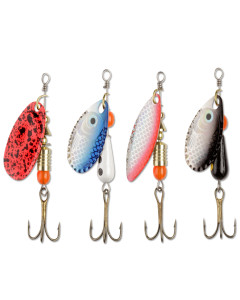This is a demo store. No orders will be fulfilled.
How to Choose The Best Spoon Fishing Lure: Techniques & Tips

In the world of angling, where precision and finesse can grant you a lot of success, especially when targeting predator fish. The choice of your lure can make all the difference between a memorable catch and an uneventful day on the water.
Spoon lures, with their timeless allure and versatile performance, have carved a legendary path in the pursuit of predator fish. Whether you're seeking to enhance your pike lure collection or are eager to cast your first spoon, this guide will navigate you through spoon fishing lures.
What is a spoon lure good for?
Spoon fishing is a versatile method that can be practised in both freshwater and saltwater. Its principle is simple: a metal spoon imitates a moving fish and attracts the attention of predators. To start, simply attach the spoon to your line, cast your bait, and retrieve the line at regular intervals to mimic the swimming of a fish.
How do spoons attract fish?
The term "spoon" comes from the shape of the lure, which resembles a small spoon. Spoon lures employ a combination of visual appeal and enticing motion to attract fish. Their unique design and action mimic the movements of injured or fleeing prey, triggering a predatory response from fish. Here's how spoon lures work their magic:


1. Flash and Glint: The polished, reflective surface of a spoon lure mimics the scales of a baitfish, creating a dazzling flash of light underwater. This flash can catch the attention of fish from a distance, drawing them closer to investigate.
2. Fluttering Action: As the spoon is retrieved through the water, its concave shape causes it to flutter and wobble, resembling the erratic movements of a wounded fish. This action is particularly effective in triggering strikes from predatory fish that are instinctively drawn to vulnerable prey.
3. Vibrations and Rattles: Many spoon lures are designed with built-in rattles or create vibrations as they move through the water. These vibrations simulate the distress signals emitted by injured fish, further enticing predators to strike.
4. Variability in Speed: Anglers can control the speed at which they retrieve the spoon lure. Altering the retrieval speed can mimic different swimming patterns of prey, adding to the lure's realism and making it more appealing to fish.


5. Targeting Different Depths: Spoon lures can be manipulated to fish at various depths by adjusting the retrieval speed and angle. This versatility allows anglers to target fish that may be cruising at different levels in the water column.
6. Reflection and Contrast: The contrast between the bright, reflective spoon and the surrounding water can be particularly enticing for fish in varying light conditions. The contrast makes the lure stand out and attracts curious or hungry fish.
7. Sound and Vibration: Depending on the design, some spoon lures produce subtle sounds or vibrations as they move through the water. These sensory cues mimic distressed or fleeing prey and can trigger strikes from nearby predators.
In essence, spoon lures capitalise on the natural instincts of predatory fish, enticing them with a combination of visual mimicry, erratic movement, and sensory cues that signal vulnerability. This makes spoon lures a versatile and effective choice for anglers targeting a wide range of species in different fishing scenarios.
A Brief History of the Spoon Fishing Lure
Delve into the captivating history of spoon-type lures, a treasure trove that has shaped sea fishing for generations. As lore has it, fisherman Julio Buel bestowed the world with commercially produced spoon lures in the 1830s.
Its origin can be traced to the lure's unmistakable resemblance to a dainty, delicate spoon. A tribute to the days of old, this designation has stood the test of time, becoming synonymous with the very essence of this angling craft.
What Can You Catch with a Spoon Fishing Lure?
These gleaming marvels have a universal allure, captivating the attention of diverse fish populations across freshwater and saltwater ecosystems.
- Pike: Use spoon lures for predators like pike lurking in tranquil lakes and canals
- Sea trout: This fish that navigates coastal waters, trout spoon for UK sea fishing offers an irresistible invitation.
- Pollock: Found in rocky hideaways of the coastline.
- Salmon: Usually coast with a fly, salmon also succumb to spoon lures as they travel upstream.
- Perch: Drawn to the dazzling flash and erratic fluttering motion that closely mimics the movements of injured or distressed prey, triggering their predatory instincts.
- Eels: freshwater eels are lured by the undulating motion and glinting flash of an angler's spoon lure.
- Zander: Enticed by the subtle vibrations and lifelike flutter of a predator fishing lure, which replicate the movements of distressed baitfish.
- Flatfish (flounder, plaice) can be enticed by spoons with hues like silver, gold, red, and black.


With spoon fishing lures, your angling horizons expand to encompass a breathtaking spectrum of species, each compelled by the timeless magic of this captivating technique.
How to Fish with a Spoon Lure: A Masterclass
- Begin by selecting the ideal spoon lure, factoring in size, colour, and weight to match the conditions.
- Cast strategically beyond your target area, allowing the spoon to sink and mimic natural prey movements.
- Experiment with retrieval techniques, alternating between steady and jerking motions to entice strikes from wary fish.
Adaptability is key – tailor your approach to changing conditions.
- For windy days, cast into the wind and let the spoon ride the waves.
- Adjust lure size and style based on water clarity.
- When you feel the bite, execute a controlled hookset and play the fish skillfully.
With these insights, you'll command the waters and experience heart-pounding action like never before.
How to Play the Spoon Lure?
The art of spoon fishing lies in animating the bait to mimic the movement of an injured or fleeing fish. Alternate between slow and fast movements, varying accelerations and pauses. Observe fish reactions and adjust your technique accordingly.
Techniques and Practical Tips for Spoon Fishing
1. Choose the right spoon for the situation and the targeted fish.
2. Use a light to medium rod for better results.
3. Cast the spoon near underwater structures and hiding spots.
4. Vary speed and retrieval rhythm to attract attention.
5. Try different movements, such as jerks or pulses.
6. Observe fish reactions to adjust your technique.
7. Opt for spoon colours suited to water visibility.
8. Be patient and persistent; spoon fishing requires practice.
9. Respect conservation rules and release unwanted fish.
10. Enjoy every moment by the water's edge. Have fun!
How To Use a Saltwater Spoon Fishing Lure
Lay anchor in sheltered bays and tranquil estuaries, for this, is where the baited spoon's magic reigns supreme. A stage set for stillness, where the spoon's journey unfurls across the seabed, its allure unrivalled by the stormy seas or the thickets of weed. Snaggy seabeds and spirited tides bow before this artistry.
Choosing the Best Spoon Fishing Lure: Navigating the Options


Flutter Spoon:
Featuring a sleek, flat profile adorned with gentle ripples, the flutter spoon showcases a mesmerizing fluttering motion that replicates wounded prey.
Emitting subtle yet enticing vibrations, it swiftly dives into the depths, making it an optimal choice for exploring the mysteries of deep waters and navigating currents.
This spoon variety is a proven favourite among pike, zander, and trout enthusiasts, ensuring a thrilling deepwater fishing adventure or successful pursuits in turbulent waters.


Spinner Spoon:
Distinguished by its conical shape enhanced with a rotating blade, the spinner lure spoon boasts a rapid and captivating rotation that releases intense vibrations into the water.
Its versatile design allows it to glide effortlessly at various depths, making it a trusted companion for serene and placid waters. Crafted to allure perch and salmon, this spoon is perfectly attuned to the tranquil realms.
Whether you're indulging in the art of angling on a serene lake or exploring the tranquil shallows, the spinner spoon promises an enthralling experience.
When is the Best Time for Spoon Fishing?
Spoon fishing can be practised throughout the year, but some seasons are more favourable than others. In spring and autumn, fish are more active and likely to bite. In summer, fish early in the morning or late in the evening when temperatures are more relaxed.
For those shopping for pike fishing tackle, remember to consider the temperature before going pike fishing in the warmer months. Stocking up on your pike fishing gear for the winter months is a good idea!
Which Rod for Spoon Fishing?
Choose a light or medium fishing rod, ranging from 1.8 to 2.4 meters in length. A telescopic rod is ideal for easy transportation. Ensure it's equipped with an appropriate-sized reel capable of handling fights with predatory fish.
Where to Go Spoon Fishing?
Spoon fishing can be done from the shore of a lake, river, or stream. After selecting your predator fishing tackle, be sure to look for fishing spots with dense vegetation. You should also look for rocks, or underwater structures are preferred by predators as they provide hiding spots for fish.
Which Spoon Colour to Choose?
The choice of spoon colour depends on fishing conditions and water visibility. Opt for bright colours like yellow, red, or orange in dark waters, and prefer natural shades like silver or bronze in clear waters.
How Much Does A Spoon Lure Cost?
You will find fishing spoon lures for sale from a few pounds to more expensive models (£2 to £20). Investing in quality spoons is recommended as they'll withstand wear and tear better and attract more fish.
In summary, spoon fishing is a captivating technique that offers unique challenges and rewards. By understanding the basics and experimenting with different techniques, you'll be able to catch a variety of predatory fish and create unforgettable moments by the water. So, grab your fishing rod, choose the perfect spoon, and embark on this exciting spoon-fishing adventure!



